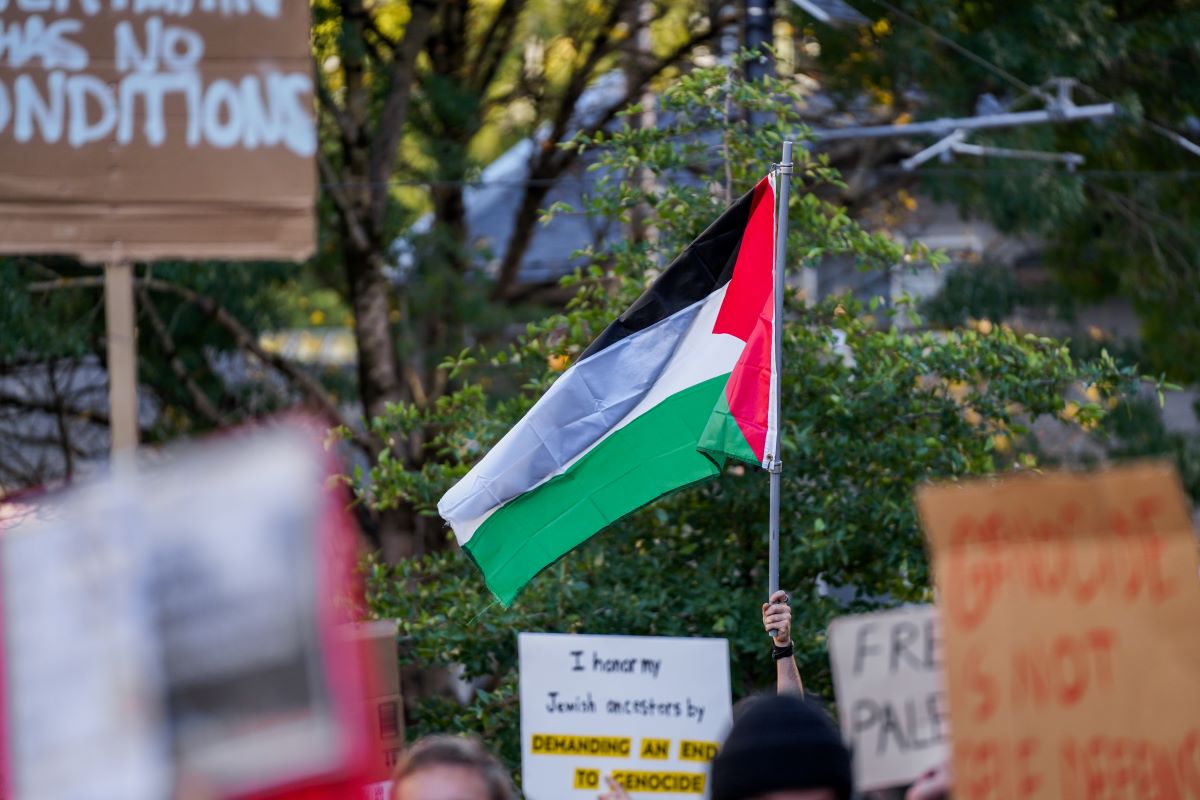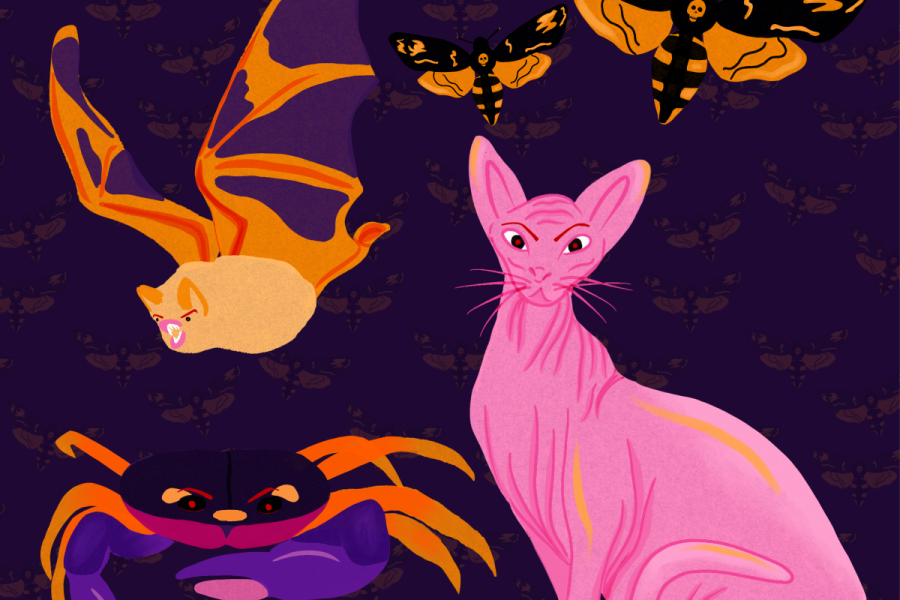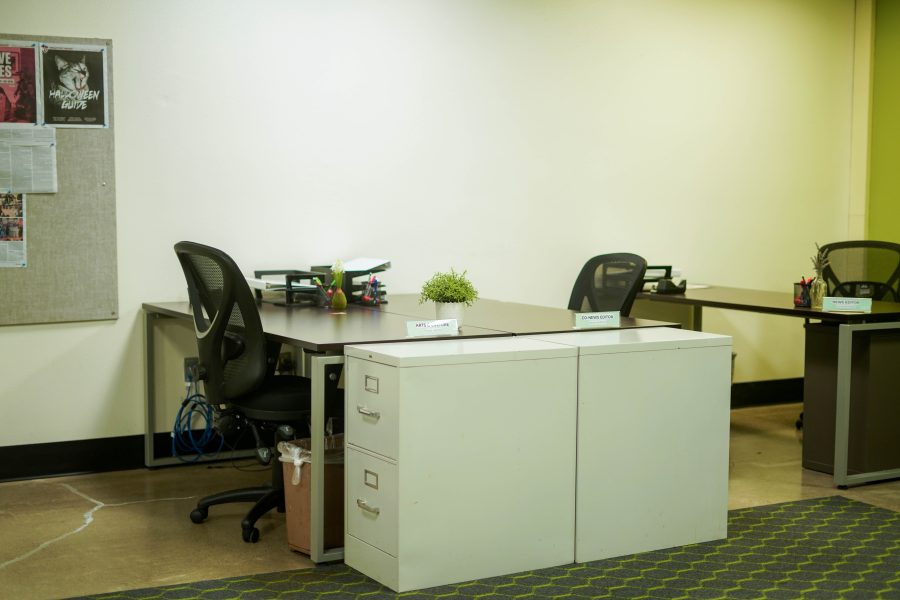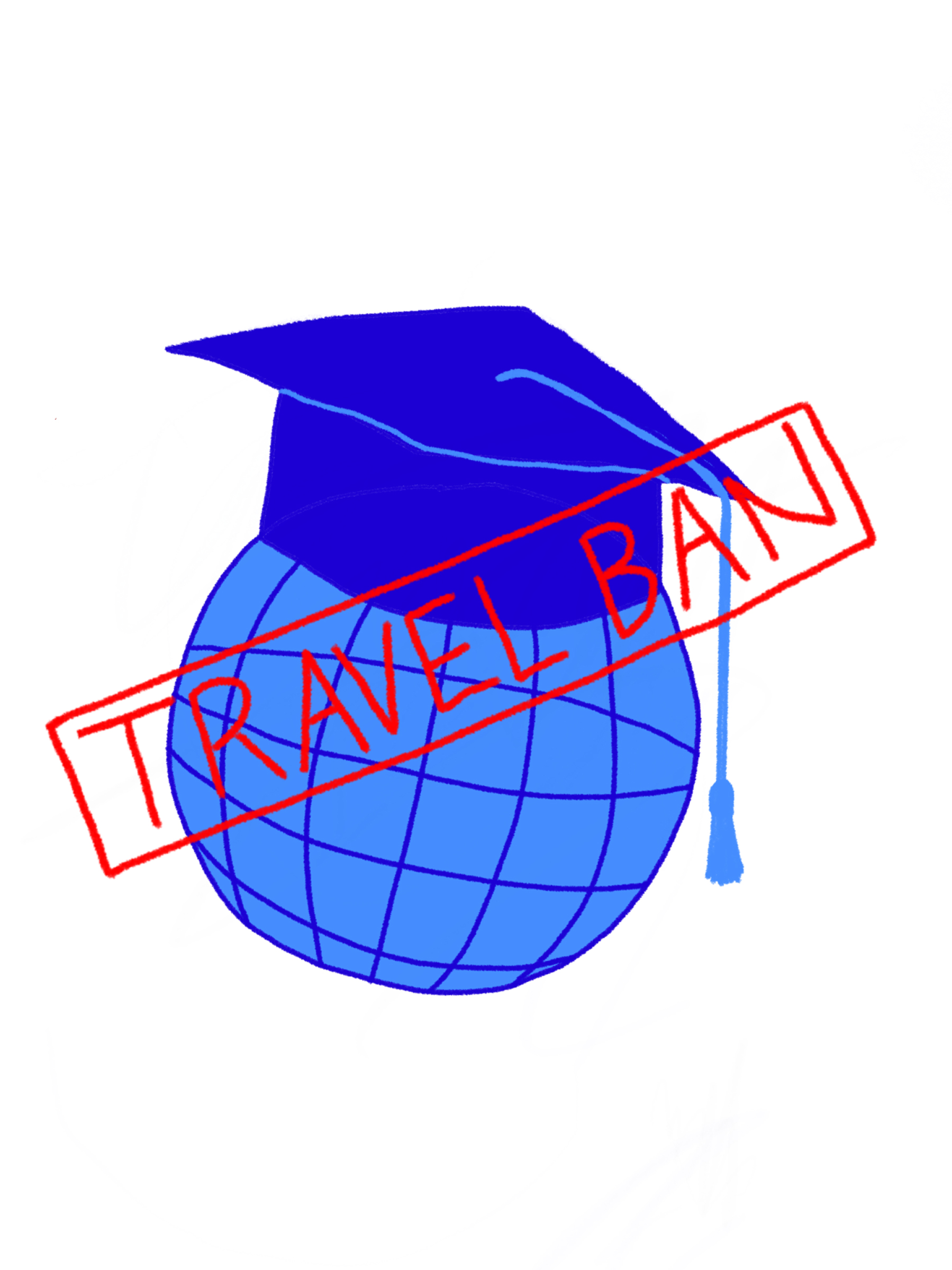This article provides narratives from all sides—from Jews, Israelis and Palestinians. It is a collaborative effort by Portland State Vanguard to convey a fuller, more inclusive portrayal of the reality unfolding on campus.
While further historical context surrounding the Israeli-Palestinian crisis is necessary for the following dialogue, the primary goal of this article is not to fully address the crisis itself, but rather its effects on members of the Portland and Portland State communities. The quotes below are experiences and opinions belonging to those quoted and don’t necessarily represent the opinions of PSU Vanguard.
Discussion around campus
A small crowd gathered behind city hall at 3:00 p.m. on Friday, Oct. 13. By 3:10 p.m., hundreds appeared to show support for Palestine. The crowds of protestors marched to the front of the building, calling chants along the way.
“From the river to the sea, Palestine will be free!” the crowd called out. “Stop U.S. aid to Zionist Apartheid!” it cried out a moment later.
After the demonstration reached the open space in front of the hall, people began taking turns speaking publicly.
“We just want to be free,” said Ruba Jordan in her speech to the passionate crowd. “We just want our kids to have futures. We don’t want families to be wiped completely. We just want to live like anybody else.”
Throughout the rally, those protesting held hundreds of makeshift picket signs and flags above their heads.
“Stop colonization, free Palestine,” one sign read.
The complicated history between Israel and Palestine is a tragic, complex and longstanding point of violence and contention in the Levant.
Tensions and violent altercations between Hamas and Israel have left Palestinians, Israelis, civilians and tourists in the crossfire. On Oct. 7 of this year, Hamas launched an unprecedented air and land attack on the Israeli people, escalating the conflict.
“I reject the framing of this as a conflict,” said Dr. Stephanie Wahab, a professor in the school of social work at PSU. “I don’t think of it as a conflict, but rather as an occupation. I feel like conflict doesn’t even begin to describe the experience of Israeli aggression, of violence, of dispossession, of land theft and apartheid on Palestinians over the past 75 years.”
Wahab’s father was a Palestinian refugee in 1948, and she has spoken and written about the crises of the region before.
The conversation and activism happening at PSU often hinges on an unequivocal, absolutely categorical judgment of land rights and Indigeneity. One might say this perspective is oversimplified, misinformed and creates disharmony.
One Jewish alum of PDX Hillel—who has a Bachelor of Art in Indigenous studies—wished to remain anonymous. “We are an ancestral peoples of that land,” they said. “We do not deny that Palestinians are also an ancestral peoples of that land. However, people are dehumanizing us based on the misinformed claim that we are colonizers and foreign occupiers.”
“People need to understand that Jews were in Europe because of diaspora, and even when we were in diaspora, we were identified as Jews,” the Jewish alum said. “We can tie our roots to that land [of Israel] for thousands of years… It is not a biblical heresy. It is archaeological. It is anthropological. It is ancestral. It is linguistic. Et cetera.”
“So, being in Israel is an act of self determination,” the Jewish alum said. “It is one of the biggest, most successful Indigenous sovereignty movements. Does it mean that it is exempt from criticism? Does it mean that it is perfect? No. Indigeneity is not a virtue. Indigeneity is a responsibility that people have to their land.”
One individual at the Oct. 13 demonstration, Ali Kamal, identified themself as being from Palestine. They spoke out about the violence which the Palestinian people are being subjected to by the Israeli state.
“What’s happening is inhuman,” Kamal said. “The bombing of the people has to stop. There’s 2.3 million people in Gaza, and they’re being bombed as we speak. That is inhuman. That is unacceptable. It has to stop.”
Students and PSU organizations have held numerous rallies around campus since the escalation of violence in early October. Many have shown support for Palestinians at PSU. The Portland Jewish Voice for Peace organization gathered to call for a ceasefire on Oct. 19. That same day, the PSU Students United for Palestinian Equal Rights (PSU-SUPER) and Progressive Campus Solidarity Union (PCSU) held a rally which demanded Palestinian freedom.
Many Portlanders have also been gathering to show support for Jews and Israelis. Oregon for Israel organized a peace rally on Oct. 22. The Jewish Federation of Greater Portland hosted a candle-lit vigil to stand in solidarity with Israel on Oct. 9. Hundreds gathered to mourn and condemn the antisemitic acts of Hamas—including mass murder, assault and the ongoing hostage crisis.
Dr. Natan Meir—an American-Israeli and the chair of the Judaic studies department at PSU—recognized the importance of distinguishing Hamas from the Palestinian people in general. “The radical antisemitism of Hamas is not the ideology that motivates the Palestinian nationalist movement as a whole, and there are many Palestinians who are not antisemitic,” Meir said.
“But make no mistake: pro-Palestinian activists—including some on the PSU campus—who call for Palestine to be liberated ‘from the river to the sea’ are not just calling for the establishment of a Palestinian state,” Meir stated. “They are calling for the destruction of Israel and—along with it—the destruction of all Jews living in Israel. When they call Israel evil, they are invoking thousands of years of anti-Jewish and antisemitic hatred that viewed the Jews as the epitome and ultimate embodiment of evil in the world.”
Polarization
Regardless of how people interpret or relate to the Israel-Palestine conflict, listening to the lived experiences shared by the people in the community is necessary for maintaining inclusivity and peace here at PSU.
“It’s divisive, because it’s a bitter, intractable, complex conflict, and because people like things to be simple,” Meir said. “They feel that they have to take one side or another rather than understanding that there are two narratives.”
The black-and-white framing of this conflict has substantially intensified anxiety, fear, grief and animosity at PSU.
“Since students who are active on campus tend to also be active politically, they get taken in by the ideologically-polarized rhetoric that often swirls around American college campuses, which—because it’s simplistic—is far easier to digest than a historically accurate explanation of the conflict, which people usually don’t have time for,” Meir stated.
Notably, classrooms on campus have become a facet of these divisions. Some teachers have made isolating statements. Students who are uncomfortable contradicting their teachers are left feeling disenfranchised.
“I have spoken with PSU students over the years who have said that they felt that professors in certain classes [which teach about] the Middle East spoke out stridently against Israel rather than maintaining objectivity and distance, which should be any college professor’s approach,” Meir stated.
“It’s difficult for those who are in these classes to feel safe, because their humanity has been stripped away from them, and they are being casted as this evil person,” the Jewish alum said.
Wahab argued that we need to take a stand for Palestine and engage in a thoughtful conversation addressing the dehumanization of the Palestinian people.
“I think Palestinians and Israelis are either going to live together or die together,” Wahab said. “I think we can live together, but I think it has to begin with an end to seven decades of daily violence against Palestinians and an end to the occupation… There needs to be sound, slow, thoughtful voices speaking up around stopping the occupation.”
“Suffering, getting bombed, having their land stolen—it has to stop,” Wahab said. “There has to be an end to this, they have to reach some kind of peace treaty… We’re hoping that will happen.”
Everyone agrees the violence needs to end, but what that entails is not a simple matter.
“What happened was a war crime, and right now Israel is being defensive,” the Jewish alum said. “It is defending its people… You can’t call it genocidal. Genocide is about intent. Not every war is a genocide, because genocide is talking about the intent. It’s about the eradication of the people.”
The Jewish alum noted experiencing feelings of indifference toward Jewish suffering from the Portland community, and that a loud response to violence against Israelis, specifically the attack on Oct. 7, has been justification rather than empathy.
“It is especially hard when anti-Zionists respond saying that Palestinians have been suffering for 70-or-so years,” the Jewish alum said. “And this is not denying the Palestinian suffering and the trauma that comes with it. It’s very real, and it’s very important to recognize. But in no way does it justify or mean that Israelis and Jews were asking for it or deserving of it.”
Antisemitism in Portland
A common sentiment repeated throughout interviews with Vanguard was that rhetoric and actions expressed on campus are conducive to an environment which is exclusionary and prejudiced toward Jewish and Israeli students, based on their religious affiliation or nationality.
“Some of our Jewish students are fearful of having their Jewish identity be known publicly because of what they perceive as a campus that is generally unfriendly to Jews, and—more specifically—to Jews who identify with Israel,” Meir stated. “From my perspective, I want all students of any background—whether religious, racial, ethnic or any other category—to feel comfortable publicly identifying with their group or political cause of choice.”
The Jewish alum argued that ignoring or dismissing the voices of Jews and Israelis in this discussion also dehumanizes and justifies violence against Jews. “Teachers and students have made statements about what is going on, [but] have not shown or expressed or demonstrated any level of compassion or sympathy for the immense trauma that this [Oct. 7] massacre has brought onto the Jewish and Israeli community,” they said.
“The rhetoric is that it’s deserving almost” the Jewish alum said. “Which is insane to experience when you’re in feminist circles, for example, to have the mass rape-fest that happened to be justified, or to just say, “Oh, they were asking for it…’ It’s very dehumanizing.”
“My friend—she is afraid to wear her Magen David [necklace] in class,” the Jewish alum said. “She started off classes wearing it, because it’s part of her culture, because it’s part of her identity.”
Another Jewish-Israeli PSU student who wished to remain anonymous spoke on this issue, “I don’t feel safe walking around with any clear symbol on me that shows that I’m Jewish or I’m Israeli,” they said. “And it’s things that I’m proud of, and I should be able to be proud of my identity. But unfortunately, with everything going on, I don’t know who’s demonizing me, and I don’t know who literally thinks that my life doesn’t matter, or that I’m better dead.”
Jews feeling the need to hide their identity for fear of antisemitism is far from unprecedented. However, currently, the United States is experiencing one of the most significant waves of antisemitism it has ever seen.

Islamophobia
People on all sides of this issue suffer due to extremism and prejudice. Islamophobia has long been an issue in the U.S. While we were not able to get statements from students on campus directly speaking to their experience, it is clear the Israel-Palestine conflict has exacerbated Islamophobia and blatant racism.
The Oct. 13 rally organized by PSU-SUPER was conscious of potential violence. Initially planned for an earlier date, the rally was rescheduled due to direct threats against the protest.
Additionally, Vanguard received reports that protest organizers were facing hate on campus the day before the original rally date, including physical violence, being shoved and having their food spit on.
According to KOIN 6, the Islamic Society of Greater Portland (ISGP) has reportedly faced death threats, and students attending the mosque have experienced bullying in their community, leading to increased fear.
“We believe this current wave of anti-Muslim and anti-Palestinian incidents we are experiencing nationwide is a director result of the ongoing dehumanization of the Palestinian people and the denial of their human rights,” stated Ibrahim Hooper, the national communications director for the Council on American-Islamic Relations (CAIR).
“It makes people afraid to engage in free speech and makes people afraid for their safety,” stated Corey Saylor—the research and advocacy director at the CAIR—in an interview with KOIN 6. “And it makes people afraid to engage in the political life that should be the bedrock of the [U.S.] where we present different opinions. I want to be very clear: Islamophobia, antisemitism, racism, ethnic hate, whether you’re targeting Arabs, all of that stuff, is unacceptable.”
According to NPR, Palestinian-Americans are experiencing workplace discrimination, ranging from employers instructing them not to voice their opinions due to concerns about potential antisemitism to incidents of doxing and job-termination.
Across the U.S., Muslims, Arabs and Palestinians have suffered hate crimes and acts of violence directly linked to the conflict between Israel and Palestine. One tragic example of this was on Oct. 14, when “a 6-year-old Palestinian-American was stabbed 26 times for being Muslim,” as CNN stated.
On college campuses, Muslim students have experienced targeted acts of hate in the past weeks. For example, in a recent incident at the University of Texas, pro-Palestinian students were harassed and intimidated, being called terrorists for their organizing an educational event about the history behind the conflict.
In a statement, the ISGP said they are saddened and concerned about the threats, and that they “urge everyone to promote understanding and peace during these challenging times, and to remember that violence and hatred solve nothing.”

What now?
This war has had far-reaching impacts on the rest of the world, inciting violence on many innocent people from Jewish, Muslim, Israeli and Palestinian communities.
Engagement with this conflict should not be reduced to a binary of support or opposition between these complex and diverse peoples.
“On Monday Oct. 9, for example, I asked my students what they thought had made some of their peers rejoice at horrific murders of children and babies, so horrific I could not repeat the details in class and cannot repeat them here,” stated Dr. Moshe Rachmuth, an Israeli and professor of Hebrew studies at PSU.
“My students gave me an interesting perspective,” Rachmuth said. “For some, my students said everything was like a sport. ‘There’s your team, and there’s my team. If your team suffers then my team wins, and that’s all that matters.’” If this is indeed a widely held perspective, then “we, the professors at PSU, have a difficult task ahead of us,” Rachmuth explained.
Dr. Nina Spiegel—professor of Israel studies at PSU—highlighted the importance of students practicing critical thought and intentional reading, both in their communities and online.
“Learn how to delve below slogans and headlines and appreciate the complexities, challenges and collective memories of these societies,” Spiegel said.
Wahab agreed.
“I think one part is just becoming more informed,” Wahab said. “I think [be] more careful and critical readers, especially when it comes to news and the depictions and stories that are represented [with] U.S. news in particular.”
Wahab added that seeking out and listening to Palestinian voices—especially in heavily charged times like these—is crucial. “We’re everywhere, and we don’t get the luxury to grieve in moments like these,” Wahab said.
One Jewish and Israeli PSU student who wished to remain anonymous offered an ideological shift in thinking about how to engage with the crisis and the people affected by it. “It’s really important that it not be an ‘us versus them’ mentality,” they said. “You don’t have to dismiss one for the other.”






